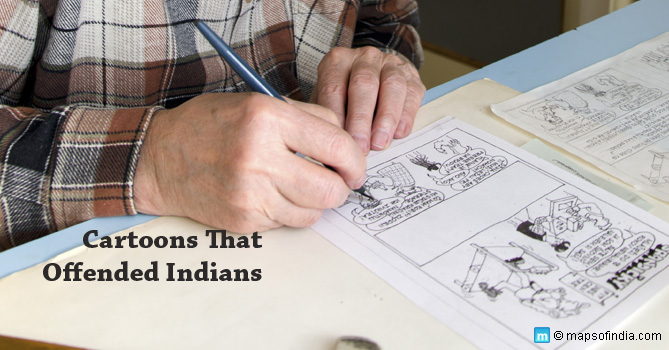They are apparently harmless cousins of harsh criticism, a satire wrapped in comical characters and comments. India, which has seen eminent cartoonists subtly playing the role of conscience keepers of the nation, has witnessed bouts of intolerance towards caricatures and cartoons. It’s easy to enrage Indians at times, and they are quick to take offence. While some cartoonists may have been little more ambitious in asking uncomfortable questions, others have simply tried to use humour to hammer the rough edges of the society.
When Twitter was enraged yesterday after Delhi Chief Minister Arvind Kejriwal shared a cartoon that had a Hanuman-like character, the memories of the past controversies surrounding cartoons came alive.
Here’s a list of incidents where cartoons created controversies in India.
1. Sedition Charges Against Aseem Trivedi
When cartoonist Aseem Trivedi was displaying cartoons during the Anti-corruption Movement in November 2011, little did he know that his work would be tagged as seditious. In September 2012, the cartoonist was charged with sedition under Section 124 (A) of the Indian Penal Code. One of his cartoons reportedly depicted the Parliament as a commode and showed the National Emblem with wolves and not lions. That was his way of satirizing unabated corruption in India.
2. RK Laxman’s Cartoon Removed from NCERT Textbooks
Eminent cartoonist, RK Laxman, who was known for taking a dig at politicians who forget their promises, had to face the ire of the people and his cartoons were deleted from the NCERT textbooks for Political and Social Science. The legendary humourist had created a cartoon showing a beggar holding a bowl before a garlanded Indira Gandhi. The panel, which was constituted by the government, identified it as an “educationally inappropriate material” and said that the cartoon should be deleted as it showed politicians and bureaucrats in “an incorrect way”.
3. Jadavpur University Professor Arrested for Sharing Cartoons Criticizing Mamata Banerjee
Jadavpur University professor Ambikesh Mahapatra had no idea what was coming his way when he allegedly forwarded anti-Mamata Banerjee cartoons via email. On 12 April 2012, a week before he was arrested by the police, Mahapatra was assaulted by a group of people. The professor had uploaded a caricature of Satyajit Ray’s film ‘Sonar Kella’ (Golden Fort) that showed Mamata and her aide, Mukul Roy, discussing ways to get rid of party MP, Dinesh Trivedi. The professor was released on bail, but only after he wrote that he was an active member of the Communist Party of India (Marxist). Professor, however, claimed that he was forced to make that statement. Justice didn’t remain elusive in this case, as the Calcutta High Court directed the state government to pay additional compensation of Rs.50,000 within a month to Mahapatra for arresting him.
4. Marathi Newspaper Attacked for Publishing Cartoon on ISIS
Offices of Lokmat, a leading Marathi newspaper, were attacked in Maharashtra after it carried an article titled ‘ISIS cha Paisa’ (ISIS’ money). The accompanying cartoon that showed ISIS getting funding in Piggy bank, raised heckles with the members of the Muslim community. While the copies of the Sunday edition were burnt for carrying a ‘blasphemous’ cartoon, hundreds of Muslims in Maharashtra staged protests. A particular section of the society criticized this attack by stating that ISIS doesn’t represent Islam and there was no reason why the cartoon should have hurt the sentiments of Muslims.
5. When Other Countries Mocked India With Their Cartoons
It was only recently that the New York Times mocked India with a cartoon on Climate Change. The controversy was sparked off when the news daily carried a cartoon depicting India as an elephant on a railway track. It showed how the elephant is blocking a train named ‘Paris Climate Summit’. The idea, as it seems, was to mock the stand India took at the Paris Climate Conference.
On a similar note, a leading Australian daily, owned by Rupert Murdoch, carried a cartoon that portrayed a poor Indian family breaking up solar panels and trying to eat them with ‘mango chutney’. Many rebuked the news daily for endorsing a racist cartoon.
While we question “blatant political interference” by the government against freedom of expression and condemn the growing intolerance at home, we should also keep an eye on the cartoons circulated in foreign media that mock India and its governance under the garb of humour.





